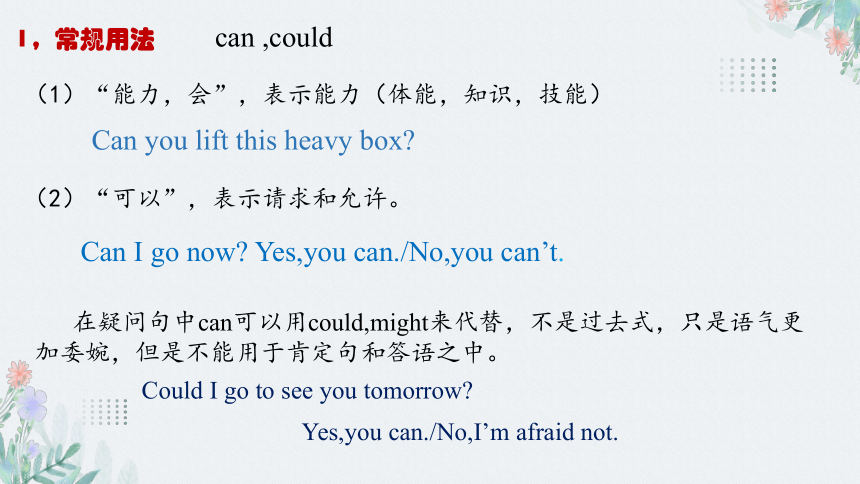2024届高考英语二轮复习之情态动词课件(共16张PPT)
文档属性
| 名称 | 2024届高考英语二轮复习之情态动词课件(共16张PPT) |

|
|
| 格式 | pptx | ||
| 文件大小 | 8.9MB | ||
| 资源类型 | 教案 | ||
| 版本资源 | 通用版 | ||
| 科目 | 英语 | ||
| 更新时间 | 2024-03-29 20:56:10 | ||
图片预览







文档简介
(共16张PPT)
情态动词
(1)肯定推测 must/might/may
(2)否定 can’t/couldn’t /may not /might not
(3)疑问 can/could
2,表示推测
1,常规用法
情态动词的三用法
3,虚拟语气 should/ought to/could/might/need
1,常规用法
can ,could
(1)“能力,会”,表示能力(体能,知识,技能)
Can you lift this heavy box
Can I go now Yes,you can./No,you can’t.
(2)“可以”,表示请求和允许。
在疑问句中can可以用could,might来代替,不是过去式,只是语气更加委婉,但是不能用于肯定句和答语之中。
Could I go to see you tomorrow
Yes,you can./No,I’m afraid not.
may, might
(1)表示请求和允许。
might比may语气更委婉,而不是过去式。肯定回答要用can和may来代替could 或might。否定回答用can’t或mustn’t,表示“不可以,禁止”
May / Might I take this book out of the room
Yes,you can/may./No,you can’t/mustn’t.
(2)用于祈使句,表示祝愿。
May you succeed!
1,常规用法
(1)表示请求,建议等,would比will更委婉。
Will /Would you pass me the ball,please
(2)表示意志、愿望和决心。
I will never do that again.
(3)would表示过去反复发生。Would 表示过去的习惯比used to 正式,且没有“现已无此习惯”的含义。
During the vocation, he would visit me every other day.
1,常规用法
will, would
must , have to
(1)表示必须、必要。
在回答must引出的问句时,如果是否定的,不能用mustn’t(禁止,不准),而要用needn’t,don’t have to(不必)
Must you hand in your report today
Yes,I must./No,I needn’t.
(2)must是说话人的主观看法,而have to 则强调客观需要。must只有一般现在时。have to 有更多的时态形式。
I really must go now.
I had to work when I was your age.
1,常规用法
must表示推测(只用于肯定的陈述句),意为“一定,准是”:must do 表示对目前情况的推测,must have done 表示对过去情况的推测。
You’re Tom’s good friend, so you must know what he likes best.
May / Might I take this book out of the room
Yes,you can/may./No,you can’t/mustn’t.
1,常规用法
(1)dare做情态动词用时,常用于疑问句、否定句和条件从句中,过去式为dared。
How dare you say I’m unfair
dare和need作实义动词用时,有人称,时态和数的变化,都可以跟带to的不定式。
(2)need做情态动词用时,常用于疑问句、否定句。在肯定回答时一般用must,否定回答时用needn’t
Need I finish the work today
Yes, you must./ No, you needn’t.
1,常规用法
dare need
(1)shall 用于第一、第三人称疑问句时,表示说话人征求对方的意见或向对方请求;
Shall用于第二、第三人称,表示说话人给对方命令,警告,允诺或威胁。
How dare you say I’m unfair
(2)should表示“应该”,在疑问句中常用should代替ought to。“should+have+过去分词”表示“本应该在过去做但没有做”
表示吃惊,作“居然,竟然”讲
Shall he come in now
1,常规用法
Shall should
You shall fail if you don’t work hard.
You should help him because he is in trouble.
(1)ought to 意为“应该,应当”,没有人称和数的变化。Ought to的否定形式为ought not to或oughtn’t to,其一般疑问句形式是将ought置于主语前。多数情况下,ought to 可与should 互换使用。
Ought I to go
Yes, you ought to./No, you oughtn’t to.
(2)ought to/should have done表示“过去应该做而未做”,其否定句则表示“过去不该做但做了”
I’m sorry. I ought to/should have phoned to tell you I was coming.
1,常规用法
Ought to
表示推测
He must be a lawyer.
He may/might be a lawyer.
Can/Could he be a lawyer
He can’t/couldn’t be a lawyer.
他一定是个律师。
他可能是个律师。
他不可能是个律师。
他可能是个律师吗
must后面不跟实义动词,以免引起歧义:He must come tonight.
(翻译成:他今晚必须来。)
He will come tonight.
(可用will表示推测,表示:他今晚要来。)
他现在肯定不在工作。
其他时态的推测
He must have left.
他肯定已经走了。
He must have been waiting for along time.
他一定在这里等了很长时间。
He can’t/couldn’t be working now.
情态动词虚拟语气
1,should have done 本应该做某事(结果没做)
ought to have done
2, shouldn’t have done 本不应该做某事(结果做了)
oughtn’t have done
3, need have done 本需要做某事(结果没做)
needn’t have done 本不需要做某事(结果做了)
4, could have done 本可以做某事(结果没做)
5, might have done 本不可以做某事(结果做了)
1,He might have left yesterday,nobody saw him this evening.
推测
2, He might have left yesterday, but his mother was ill.
虚拟
判断下列句子是表示虚拟还是推测?
Thanks!
2
0
2
4
情态动词
(1)肯定推测 must/might/may
(2)否定 can’t/couldn’t /may not /might not
(3)疑问 can/could
2,表示推测
1,常规用法
情态动词的三用法
3,虚拟语气 should/ought to/could/might/need
1,常规用法
can ,could
(1)“能力,会”,表示能力(体能,知识,技能)
Can you lift this heavy box
Can I go now Yes,you can./No,you can’t.
(2)“可以”,表示请求和允许。
在疑问句中can可以用could,might来代替,不是过去式,只是语气更加委婉,但是不能用于肯定句和答语之中。
Could I go to see you tomorrow
Yes,you can./No,I’m afraid not.
may, might
(1)表示请求和允许。
might比may语气更委婉,而不是过去式。肯定回答要用can和may来代替could 或might。否定回答用can’t或mustn’t,表示“不可以,禁止”
May / Might I take this book out of the room
Yes,you can/may./No,you can’t/mustn’t.
(2)用于祈使句,表示祝愿。
May you succeed!
1,常规用法
(1)表示请求,建议等,would比will更委婉。
Will /Would you pass me the ball,please
(2)表示意志、愿望和决心。
I will never do that again.
(3)would表示过去反复发生。Would 表示过去的习惯比used to 正式,且没有“现已无此习惯”的含义。
During the vocation, he would visit me every other day.
1,常规用法
will, would
must , have to
(1)表示必须、必要。
在回答must引出的问句时,如果是否定的,不能用mustn’t(禁止,不准),而要用needn’t,don’t have to(不必)
Must you hand in your report today
Yes,I must./No,I needn’t.
(2)must是说话人的主观看法,而have to 则强调客观需要。must只有一般现在时。have to 有更多的时态形式。
I really must go now.
I had to work when I was your age.
1,常规用法
must表示推测(只用于肯定的陈述句),意为“一定,准是”:must do 表示对目前情况的推测,must have done 表示对过去情况的推测。
You’re Tom’s good friend, so you must know what he likes best.
May / Might I take this book out of the room
Yes,you can/may./No,you can’t/mustn’t.
1,常规用法
(1)dare做情态动词用时,常用于疑问句、否定句和条件从句中,过去式为dared。
How dare you say I’m unfair
dare和need作实义动词用时,有人称,时态和数的变化,都可以跟带to的不定式。
(2)need做情态动词用时,常用于疑问句、否定句。在肯定回答时一般用must,否定回答时用needn’t
Need I finish the work today
Yes, you must./ No, you needn’t.
1,常规用法
dare need
(1)shall 用于第一、第三人称疑问句时,表示说话人征求对方的意见或向对方请求;
Shall用于第二、第三人称,表示说话人给对方命令,警告,允诺或威胁。
How dare you say I’m unfair
(2)should表示“应该”,在疑问句中常用should代替ought to。“should+have+过去分词”表示“本应该在过去做但没有做”
表示吃惊,作“居然,竟然”讲
Shall he come in now
1,常规用法
Shall should
You shall fail if you don’t work hard.
You should help him because he is in trouble.
(1)ought to 意为“应该,应当”,没有人称和数的变化。Ought to的否定形式为ought not to或oughtn’t to,其一般疑问句形式是将ought置于主语前。多数情况下,ought to 可与should 互换使用。
Ought I to go
Yes, you ought to./No, you oughtn’t to.
(2)ought to/should have done表示“过去应该做而未做”,其否定句则表示“过去不该做但做了”
I’m sorry. I ought to/should have phoned to tell you I was coming.
1,常规用法
Ought to
表示推测
He must be a lawyer.
He may/might be a lawyer.
Can/Could he be a lawyer
He can’t/couldn’t be a lawyer.
他一定是个律师。
他可能是个律师。
他不可能是个律师。
他可能是个律师吗
must后面不跟实义动词,以免引起歧义:He must come tonight.
(翻译成:他今晚必须来。)
He will come tonight.
(可用will表示推测,表示:他今晚要来。)
他现在肯定不在工作。
其他时态的推测
He must have left.
他肯定已经走了。
He must have been waiting for along time.
他一定在这里等了很长时间。
He can’t/couldn’t be working now.
情态动词虚拟语气
1,should have done 本应该做某事(结果没做)
ought to have done
2, shouldn’t have done 本不应该做某事(结果做了)
oughtn’t have done
3, need have done 本需要做某事(结果没做)
needn’t have done 本不需要做某事(结果做了)
4, could have done 本可以做某事(结果没做)
5, might have done 本不可以做某事(结果做了)
1,He might have left yesterday,nobody saw him this evening.
推测
2, He might have left yesterday, but his mother was ill.
虚拟
判断下列句子是表示虚拟还是推测?
Thanks!
2
0
2
4
